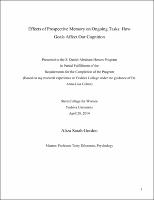Please use this identifier to cite or link to this item:
https://hdl.handle.net/20.500.12202/3973Full metadata record
| DC Field | Value | Language |
|---|---|---|
| dc.contributor.author | Gordon, Aliza | - |
| dc.date.accessioned | 2018-10-16T19:15:30Z | - |
| dc.date.available | 2018-10-16T19:15:30Z | - |
| dc.date.issued | 2014-04-28 | - |
| dc.identifier.uri | https://hdl.handle.net/20.500.12202/3973 | - |
| dc.identifier.uri | https://ezproxy.yu.edu/login?url=https://repository.yu.edu/handle/20.500.12202/3973 | |
| dc.description | The file is restricted for YU community access only. | - |
| dc.description.abstract | Studies have shown that having an incomplete intention affects our ongoing tasks. The literature discusses an intention interference effect that occurs upon encountering an intention-related, or prospective memory (PM) cue; ongoing task efficiency is slowed as a result of recognizing a PM cue. 60 undergraduates completed a Flanker Task, received one of 3 types of instructions, then completed another block of Flanker Task trials. Flanker Task RTs were measured to assess the impact of the intention interference effect on the ongoing Flanker Task. We hypothesized that the intention interference effect would also be present at the level of perception. That is, participants would have greater perception of PM cues than other cues and this would have costs on their ongoing tasks. We also hypothesized that participants would experience an intention-interference effect even when confronting PM cues in unexpected contexts. Our results corroborated the first hypothesis; RTs on the Flanker Task were slowed as a result of noticing PM cues. However, our results did not support the second hypothesis and we did not see an interference effect caused by encountering unexpected PM cues. Our findings demonstrate the human cognitive flexibility to turn on and off attention toward peripheral cues depending on its relevance to our goal completion. | en_US |
| dc.description.sponsorship | S. Daniel Abraham Honors Program | en_US |
| dc.publisher | Stern College for Women | en_US |
| dc.rights | Attribution-NonCommercial-NoDerivs 3.0 United States | * |
| dc.rights.uri | http://creativecommons.org/licenses/by-nc-nd/3.0/us/ | * |
| dc.subject | Prospective memory | en_US |
| dc.subject | Memory | en_US |
| dc.title | Effects of Prospective Memory on Ongoing Tasks: How Goals Affect Our Cognition | en_US |
| dc.type | Thesis | en_US |
| Appears in Collections: | S. Daniel Abraham Honors Student Theses | |
Files in This Item:
| File | Description | Size | Format | |
|---|---|---|---|---|
| Aliza Gordon.pdf Restricted Access | 386.8 kB | Adobe PDF |  View/Open |
This item is licensed under a Creative Commons License

